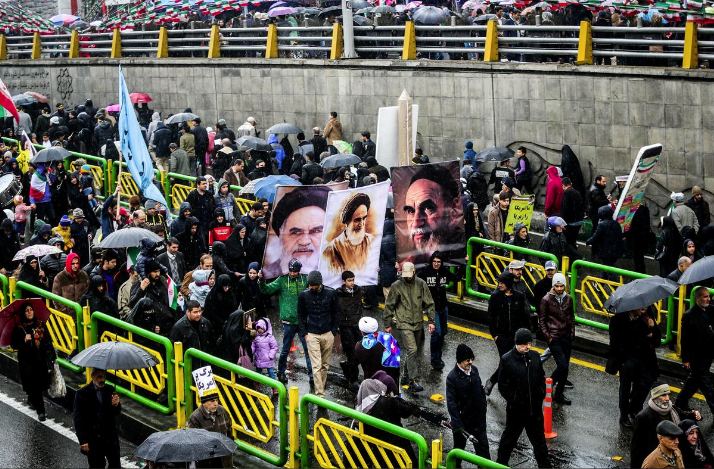40 years on, how is Iran celebrating its Islamic Revolution?
11 February 1979. Blondie's Heart of Glass reached number one in the UK charts, Jennifer Aniston celebrated her tenth birthday, and Ayatollah Khomeini seized control of the Iranian capital, Tehran.
An anniversary of this kind could pass quietly in the international forum, but a public announcement of weeklong celebrations across Iran has brought it to the fore. Forty years ago today, the previously exiled Ayatollah made a victorious return to Iran, capturing the city of Tehran from prime minister Shapour Bakhtiar.

Timeline
1951: Iran's first democratically elected party, the National Front, was given power with Mohammad Mosaddegh as leader. He was seen to be secular, progressive and very personable.
1952: Against the wishes of the Shah, Reza Pahlavi, Mosaddegh nationalised the previously British-owned Anglo-Iranian oil company, AIOC. In response, Britain and America sanctioned Iran, crippling the economy.
1953: A military coup d'état, aided by British and American intelligence, overthrew Mosaddegh and returned the Shah to power. Oil was redistributed and AIOC became known as British Petroleum, or commonly, BP.
1960-2: Dissident groups as well as groups fronted by religious leaders began attacking government officials.
1963: Larger protests began in which Ayatollah Khomeini became a popular spokesman, speaking out in favour of Islamic law and denouncing western ideals. He was exiled for openly criticising the Shah, although his speeches and works were played in cafés and sold in bookshops across Iran.
1970-6: An oil industry boom accentuated the divide between rich and poor. Protests and dissident groups grew.
1977: The Shah granted amnesty to some political prisoners at the request of American president, Jimmy Carter.
February 1, 1979: Ayatollah Khomeini makes a poignant and ultimately victorious return to Iran.
Today
Relationships with the western world, particularly with the United States, remain strained. The re-imposition of sanctions on Iranian oil as well as on financial transactions has caused more bad feeling among the Persian diaspora. The damage of this is felt around the world.

The election of Hassan Rouhani as president in 2013 was supposed to herald a new revolution in Iran – one of religious freedoms and democracy. However, although 72.2 per cent (this figure is widely disputed) of the voting Iranian public backed this reform, it appears that several of Rouhani's campaign ideals have not since come to fruition. The #MyStealthyFreedom movement in which Iranian women protest the enforcement of wearing the veil, and the imprisonment of British-Iranian citizen Nazanin Zaghari-Ratcliffe demonstrate that religious law remains at the forefront of Iranian society.
The Anniversary
To celebrate the 40th anniversary of the Islamic Revolution in Iran, the state has arranged a march to Tehran's Azadi (meaning freedom) Tower in the square of the same name. President Rouhani has, this morning, addressed the gathered crowds. He celebrated the 1979 revolution as a saving of Iran from 'tyranny, colonisation and dependence'. He not only renewed the country's allegiance to Islamic principles, but also to its missile development programme, stating, 'we will continue to pursue our path to military might'.
The people of Iran have come out in their thousands, but not without trepidation. While some are heard chanting 'Death to America', 'Death to Israel' and 'Death to the al-Saud', others are more cautious. A military march in Ahvaz to celebrate the 30th anniversary of the revolution ended in disaster, with gunmen wounding more than 20 people.
For Iranians who fled in 1979, feelings are not so clear. From one man, now living in Africa: 'The Iranian people wanted freedom, but do they think they are free now? It is hard to feel freedom with the weight of the thousands of lives lost.'
This 40th anniversary is of particular significance. The number 40 is understood to be symbolic in Islamic tradition for several reasons, but particularly resembles the age of the Prophet Mohammad when he revealed his prophethood.
It has also been announced, through state television, that Ayatollah Khamenei, the successor of Ayatollah Khomeini, will pardon a 'large number' of prisoners to mark the occasion. Iranian media have quoted this number to be as many as 50,000 individuals.
The Islamic Republic of Iran celebrates a certain coming of age today. With relationships fraught and tensions high with parts of the Western world, it is thought that today will not only be a celebration of things past, but a demonstration of resilience to come.
Nina Mattiello Azadeh studied music and philosophy and was a Faith in Politics media intern in 2016. She has a keen interest in interfaith relations, social action and is a classical ballet dancer. Follow her on Twitter @Ninamataz











